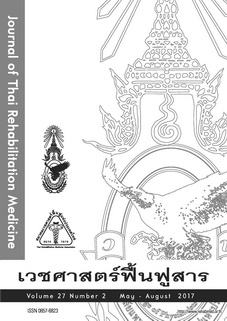การศึกษานำร่องผลของการให้โปรแกรมส่งเสริมการทำงานสมองต่อการทำงานสมองและสมรรถภาพทางกายในผู้ป่วยปอดอุดกั้นเรื้อรังระดับความรุนแรงปานกลางถึงหนัก
การศึกษานำร่องผลของการให้โปรแกรมส่งเสริมการทำงานสมองต่อการทำงานสมองและสมรรถภาพทางกายในผู้ป่วยปอดอุดกั้นเรื้อรังระดับความรุนแรงปานกลางถึงหนัก
Keywords:
COPD, cognitive impairment, cognitive improvement, pulmonary rehabilitationAbstract
Objectives: To investigate the effects of cognitive improvement program on cognitive function, physical function, and quality of life in patients with COPD performing routine endurance exercise.
Study design: Experimental study.
Setting: Maharaj Nakhon Si Thammarat hospital.
Methods: Fourteen patients with moderate to severe COPD were randomly divided into 2 groups. The patients in control group performed traditional pulmonary rehabilitation program 40 minutes/day, 5 days/week for 4 weeks. The patients in experimental group also received the same pulmonary rehabilitation program. In addition, these patients were trained cognitive improvement program for 45 minutes/day, 2 days/week for 4 weeks. Cognitive function, physical function, and quality of life were evaluated before and after the interventions by using 6MWT, MoCA-B, and EQ-5D-5L, respectively.
Results: Pulmonary rehabilitation could better 6MWT. However, it did not change cognitive function and quality of life. In the other hand, pulmonary rehabilitation plus cognitive improvement program significantly improved all observed parameters including cognitive function (p=0.003), walking distance (p=0.001), and quality of life (p=0.038). Additionally, it further increased physical function comparing to that in patients gaining a month-pulmonary rehabilitation (p=0.004).
Conclusion: A combination of pulmonary rehabilitation and cognitive therapy are likely to be more effective than pulmonary rehabilitation alone.
References
Mannino DM, Buist AS. Global burden of COPD: risk factors, prevalence, and future trends. Lancet. 2007 Sep 01;370(9589):765-73.
Celli BR, MacNee W. Standards for the diagnosis and treatment of patients with COPD: a summary of the ATS/ERS position paper. Eur Respir J. 2004 Jun;23(6):932-46.
Yohannes AM, Chen W, Moga AM, Leroi I, Connolly MJ. Cognitive Impairment in Chronic Obstructive Pulmonary Disease and Chronic Heart Failure: A Systematic Review and Meta-analysis of Observational Studies. J Am Med Dir Assoc. 2017 May 01;18(5):451 e1- e11.
From the Global Strategy for the Diagnosis, Management and Prevention of COPD, Global Initiative for Chronic Obstructive Lung Disease (GOLD) 2016. Available from: http://goldcopd.org/.
Szalewska D, Radkowski M, Demkow U, Winklewski PJ. Exercise Strategies to Counteract Brain Aging Effects. Adv Exp Med Biol. 2017 Apr 06.
Pereira ED, Viana CS, Taunay TC, Sales PU, Lima JW, Holanda MA. Improvement of cognitive function after a three-month pulmonary rehabilitation program for COPD patients. Lung. 2011 Aug;189(4):279-85.
Dodd JW, Getov SV, Jones PW. Cognitive function in COPD. Eur Respir J. 2010 Apr;35(4):913-22.
Dulohery MM, Schroeder DR, Benzo RP. Cognitive function and living situation in COPD: is there a relationship with self-management and quality of life? Int J Chron Obstruct Pulmon Dis. 2015;10:1883-9.
Salik Y, Ozalevli S, Cimrin AH. Cognitive function and its effects on the quality of life status in the patients with chronic obstructive pulmonary disease (COPD). Arch Gerontol Geriatr. 2007 Nov-Dec;45(3):273-80.
Spector A, Orrell M, Davies S, Woods B. Reality orientation for dementia. Nurs Times. 2001 Nov 29-Dec 5;97(48):37.
Spector A, Charlesworth G, King M, Lattimer M, Sadek S, Marston L, et al. Cognitive-behavioural therapy for anxiety in dementia: pilot randomised controlled trial. Br J Psychiatry. 2015 Jun;206(6):509-16.
McDowd JM. An overview of attention: behavior and brain. J Neurol Phys Ther. 2007 Sep;31(3):98-103.
Redfern MS, Chambers AJ, Jennings JR, Furman JM. Sensory and motoric influences on attention dynamics during standing balance recovery in young and older adults. Exp Brain Res. 2017 May 20.
Brown LA, Shumway-Cook A, Woollacott MH. Attentional demands and postural recovery: the effects of aging. J Gerontol A Biol Sci Med Sci. 1999 Apr;54(4):M165-71.
Nici L, ZuWallack R. Pulmonary Rehabilitation for Patients with Chronic Airways Obstruction. J Allergy Clin Immunol Pract. 2015 Jul-Aug;3(4):512-8.
Collins EG, Bauldoff G, Carlin B, Crouch R, Emery CF, Garvey C, et al. Clinical competency guidelines for pulmonary rehabilitation professionals: position statement of the American Association of Cardiovascular and Pulmonary Rehabilitation. J Cardiopulm Rehabil Prev. 2014 Sep-Oct;34(5):291-302.
Vieira DS, Maltais F, Bourbeau J. Home-based pulmonary rehabilitation in chronic obstructive pulmonary disease patients. Curr Opin Pulm Med. 2010 Mar;16(2):134-43.
Emery CF, Leatherman NE, Burker EJ, MacIntyre NR. Psychological outcomes of a pulmonary rehabilitation program. Chest. 1991 Sep;100(3):613-7.
Cleutjens F, Spruit MA, Ponds R, Vanfleteren L, Franssen FME, Dijkstra JB, et al. The Impact of Cognitive Impairment on Efficacy of Pulmonary Rehabilitation in Patients With COPD. J Am Med Dir Assoc. 2017 May 01;18(5):420-6.
Wise RA, Brown CD. Minimal clinically important differences in the six-minute walk test and the incremental shuttle walking test. COPD. 2005 Mar;2(1):125-9.
Etnier J, Johnston R, Dagenbach D, Pollard RJ, Rejeski WJ, Berry M. The relationships among pulmonary function, aerobic fitness, and cognitive functioning in older COPD patients. Chest. 1999 Oct;116(4):953-60.






